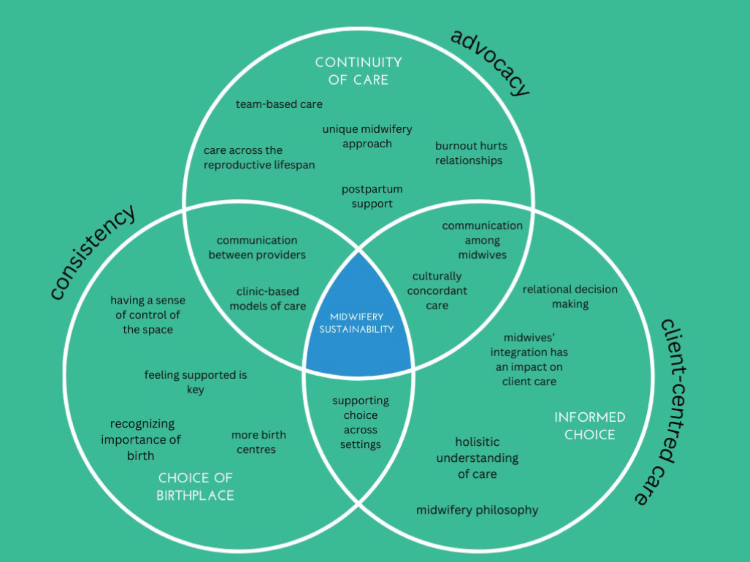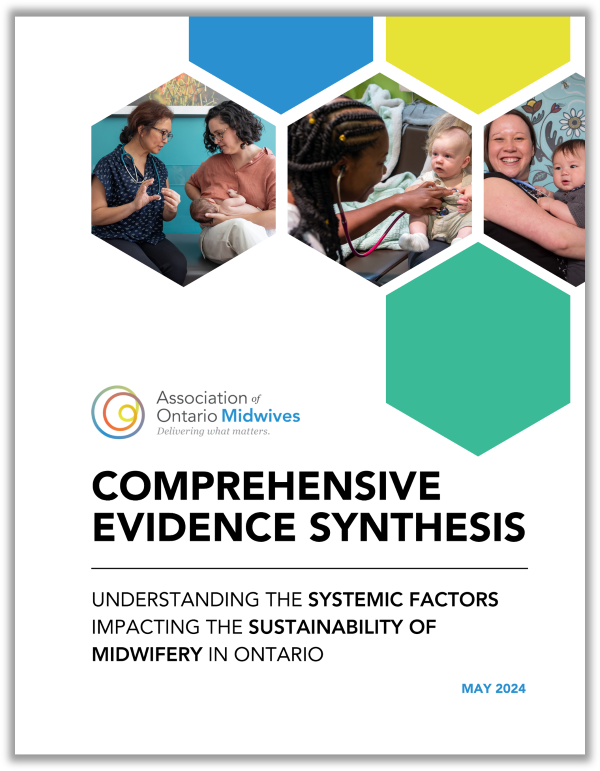Midwifery Sustainability Project
Roadmap to health system integration: Visual summary
Roadmap to health system integration
The AOM has released a visual summary of its report, Roadmap to health system integration: A critical direction for midwifery sustainability in Ontario. Flip through this condensed, accessible version, made for quick reference.
Viewing on your mobile device? Try landscape mode for best user experience!
The full length report, Roadmap to health system integration: a critical direction for midwifery sustainability in Ontario, is the culmination of the extensive research and consultation of the Midwifery Sustainability Project (MSP). The report advocates for change to create a healthy, sustainable future for midwifery, within Ontario's health system and the midwifery profession, through tangible recommendations and actions.
Midwifery Sustainability Project
In fall 2022, the AOM launched the Midwifery Sustainability Project (MSP) – directed by member resolutions, research and member-generated data – to understand, make recommendations, and advocate for the implementation of reforms to the current state of midwifery. The ultimate goal of the project is to increase the health and well-being of midwives and the sustainability of the profession, while valuing and expanding the expertise and quality care brought by midwives to their clients and to the health-care system.
With midwifery sustainability as a strategic priority in the 2022-2025 Strategic Plan, a multi-pronged consultation process began, informed by midwives, researchers and clients. The AOM sought guidance at each stage of the project from the MSP Steering Committee (MSP-SC) who represents midwives with diverse thought, identities, geography, lived experience and experience working in a variety of models. The MSP-SC continues to provide strategic guidance on the AOM's response to midwife burnout and attrition.
We heard clearly that the root causes of the burnout and attrition crisis are systemic, excluding midwives from full integration in the health-care system. We heard that midwives themselves have borne the burden of delivering a model of care without adequate integration, supports, recognition and respect, for far too long. The recommendations in the Roadmap to health system integration: a critical direction for midwifery sustainability on Ontario offer solutions to ensure midwives are well integrated and valued in the health system. The report supports the profession in providing excellent sexual, reproductive, perinatal and infant care to even more Ontarians across the province.
Read more about each element of the project below.
Project Background
AOM initiatives, such as the Denounce Bullying Campaign based on findings from the AOM's 2017 bullying survey (login required) and the Darling, et al. report on midwives' mental health and Assefa, et al ‘s research on racism in midwifery, have brought to light many factors impacting midwives and the profession. Colonial infrastructures, experiences of racism, discrimination and oppression, bullying, disability, lack of professional recognition and respect, on-call demands, secondary trauma, pay inequity and inequitable access to power and decision-making are just some examples of the intersecting issues contributing to stress, burnout and attrition across the profession and highlighting the need to consider what interventions and reforms will make the future of the profession and the lived experience of midwives more sustainable.
Comprehensive Evidence Synthesis
The Comprehensive Evidence Synthesis of midwifery sustainability research (PDF, 1.9 MB) was presented to attendees of the Midwifery Sustainability Roundtable in May of 2024. The report detailed the findings of a rigorous review of existing evidence related to midwifery sustainability and health profession sustainability in Ontario. The evidence included AOM-led research projects and member data, peer-reviewed literature, and relevant health system grey literature reports. The synthesis was strengthened by an analysis of research gaps and served as the foundation for an evidence-informed approach to addressing midwifery sustainability and health system reforms.
Focus Groups
In December of 2023, The AOM conducted two focus group discussions to better understand the factors supporting Ontario midwives' stay in the profession. The first focus group consisted of midwives in their first five years of practice, excluding new registrants. The second focus group consisted of midwives practicing for over 15 years. Midwives were guided through informal discussions reflecting on their own experiences in the profession. They were asked to identify the enablers and barriers that have influenced their engagement in midwifery. Representation of midwifery voices was sought, and participants were selected based on several criteria, including the communities and populations that midwives serve, practice arrangements, IPBOC midwifery voices, 2SLGBTQI+ midwives and midwives with disabilities. Their experiences contributed to understanding the systemic factors impacting longevity and well-being in midwifery in an Ontario-specific context. Moreover, their contributions validated the findings of the Comprehensive Synthesis data.
What keeps you engaged in the midwifery profession? Compare your experience to the responses of other Ontario midwives in the video below.
Member Surveys
AOM members were surveyed to capture broad qualitative and quantitative data on the factors that help or hinder midwives’ ability to remain in the profession. Common threads related to well-being, professional satisfaction and the structural issues impacting their practice were collated.
Midwives describe changes would make the profession more sustainable for them in the video below.
Client Cafes
In February 2024, The Canadian Institute of Health Research (CIHR) grant generously funded two events, one online and one in person, to engage clients about personal experiences and perspectives on the midwifery model of care, with an emphasis on sustainability of the profession. Clients were given the opportunity to reflect on what they most valued in their midwifery care and invited to consider whether the core principles of midwifery respond to the needs of a more diverse population of childbearing people than at the time of regulation. Clients overwhelmingly affirmed their appreciation for midwives and the care they received, while seeing the impacts of systemic division, hierarchy and practitioner burnout. Insights were shared on potential changes to the structure of midwifery to foster a healthier workforce and to increase access to midwifery care more broadly within sexual, reproductive, and infant health care.

Think Tank
In March 2024, The AOM hosted a one-day Think Tank to bring together midwifery researchers from Ontario. The goal was to present key findings of the MSP to date, generate new insights and identify critical gaps in research related to midwifery sustainability. Insights were shared by participants on key themes, including expanded opportunities, expanded scope of practice, remuneration, power and resource allocation, and integration. This Think Tank allowed for academic collaboration and ensured the latest evidence was used to inform the project’s recommendations.
Head Midwives Carousel

The Head Midwives Carousel took place in May 2024, as part of the first satellite event of the 2024 Ontario Midwifery Conference. Head midwives and other midwife hospital leaders were invited to participate in this in-person full-day event to reflect on their work and share strategies to tackle common issues in hospital integration. The event brought together 40 midwives, with the objective of connecting and strengthen the community of head midwives, strengthening leadership skills, strengthening midwife representation in hospitals and exploring sustainability from the perspectives of midwives in leadership roles. Head midwives explored the unique strengths, challenges and supports required to build bridges between the needs and voices of midwives, their clients, interdisciplinary colleagues and institutions.
Midwifery Sustainability Roundtable

The Midwifery Sustainability Roundtable offered an interactive opportunity for midwives to share ideas, experiences and contributions to shape a healthy and sustainable future for the profession in May 2024. The day included an overview of the Midwifery Sustainability Project to date, including research (the Comprehensive Synthesis) of what is known about current factors impacting the sustainability of midwifery in Ontario. Midwives were invited to validate the findings of the Comprehensive Synthesis report, identify gaps in the research, and engage in strengths-based collective problem- solving, facilitated by Shani Kipang, a leader in collaborative learning, equity and team building. The discussions led to a deeper understanding of enablers and barriers to sustainable midwifery practice, culture and integration. The findings from this full-day engagement will inform the future direction for the MSP and the AOM’s advocacy for systemic changes.

